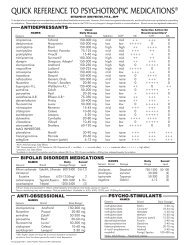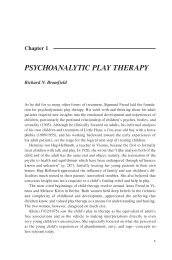IRAQ WAR CLINICIAN GUIDE
Iraq War Clinician's Guide - Network Of Care
Iraq War Clinician's Guide - Network Of Care
You also want an ePaper? Increase the reach of your titles
YUMPU automatically turns print PDFs into web optimized ePapers that Google loves.
Iraq War Clinician Guide 77 Traumatic Grief<br />
-- - -- P<br />
are not tough enough to handle combat. Delaying grief may well postpone problems that can<br />
become chronic symptoms weeks, months and years later. The returning veteran who has<br />
developed PTSD andlor depression may well be masking his or her grief symptoms.<br />
Assessment and Treatment of Acute Grief in Returning Veterans<br />
Clinical judgment is necessary in deciding when and how to treat acute grief reactions, especially<br />
when they are accompanied by a diagnosis of acute stress disorder. While a cognitive-behavioral<br />
treatment package that includes exposure therapy has been shown to prevent the development of<br />
PTSD some persons with acute stress disorder, exposure therapy during the initial stages of grief<br />
may often be contraindicated, because it may place great emotional strain on someone only just<br />
bereaved. Bereavement researchers also are hesitant to treat grief in the first few months of a<br />
normal loss, wishing not to interfere with a natural healing process. In the early stages of grief,<br />
symptoms may be experienced as intense, but this is normal for the first days, weeks, and months.<br />
Soldiers surviving a traumatic loss in the war zone will be more likely to mask intense feelings of<br />
sadness, pain, vulnerability, anxiety, anger, and guilt. Balancing other traumatic experiences with<br />
the intensity of grief may feel overwhelming. Therefore it is important to assess and respect the<br />
individual soldier's ability to cope and manage these feelings at any time. A soldier may be<br />
relieved to know that someone understands how he or she feels after losing a buddy, or<br />
experiencing other losses including civilians or multiple deaths in the field, and communication<br />
with a clinician may be a first step in coming to terms with loss. However, that soldier may not be<br />
ready to probe more deeply into feelings and circumstances. Care and patience in the assessment<br />
process, as well as in beginning treatment, is essential.<br />
Treatment during the acute stages of grief would best include acknowledgement of the loss,<br />
communication of understanding of the depth of feelings, encouragement to recover positive<br />
memories of the deceased, recognition of the good intentions of the survivor to come to the aid of<br />
the deceased, education about what to expect during the course of acute grief, and<br />
encouragement of distraction and relaxation techniques as a temporary palliative. Efforts to reduce<br />
symptoms of PTSD and depression as co-morbid disorders would take precedence over grief<br />
symptoms in the initial phases of treatment, unless the loss itself is the main cause of distress.<br />
Assessment of Complicated Grief in Returning Veterans<br />
Grief symptoms including sadness, distress, guilt, anger, intrusive thoughts, and preoccupation<br />
with the death should be declining after about six months during a normal grieving process. If<br />
symptoms remain very high after six months, clinical intervention is warranted. There are several<br />
instruments that may be helpful in assessing a complicated grief. The lnventory of Complicated<br />
Grief-Revised is perhaps most widely used and reflects current bereavement research. Another<br />
instrument is the Texas Revised Inventory of Grief, which has been used in a variety of populations<br />
and has been well validated. Both allow comparisons with normative populations.<br />
Treatment of Complicated Grief in Returning Veterans<br />
There have been no outcome studies of treatments of veterans for prolonged and complicated grief<br />
symptoms at this time. Clinical experience supports the importance of education about normal and<br />
complicated grief processes, education about the cognitive processes of guilt, restructuring of<br />
DEPARTMENT OF VETERANS AFFAIRS<br />
NATIONAL CENTER FOR PTSD




